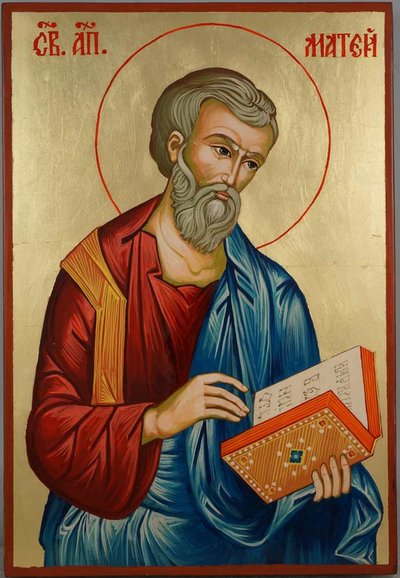Thoughts for the Day
Sunday, 21st September 2025: Matthew, Apostle and Evangelist, 2025
Tax-collectors Sin Matthew 9 Matthew Saint
Reading : Verses from Matthew, Chapter 9

As Jesus was walking along, he saw a man called Matthew sitting at the tax booth, and he said to him, 'Follow me.' And he got up and followed him.
And as he sat at dinner in the house, many tax-collectors and sinners came and were sitting with him and his disciples. When the Pharisees saw this, they said to his disciples. 'Why does your teacher eat with tax-collectors and sinners?' But when he heard this, he said, 'Those who are well have no need of a physician, but those who are sick. Go and learn what this means, "I desire mercy, not sacrifice." For I have come to call not the righteous but sinners.
(Lectionary, New Revised Standard Version)
Thoughts
Today we celebrate the life of Saint Matthew. I have looked at his calling before (eg see 2024 and 2025) but perhaps we can think today, firstly about the shock his appointment as one of Jesus' disciples must have been to everyone. He was managing taxes for the Romans, and would have been a total outcast, not least because the Hebrew nation believed only Temple tax to God was permissible, but because he was breaking the purity laws each day - simply by touching their money! But he was to be forgiven by Jesus for his sin and granted the opportunity to spread the good news.
Second, let us think how this calling would have affected others, offering hope to other outcasts. Indeed we read that Jesus sat at dinner with other tax-collectors and sinners later that day. While we don't know who the latter sinners were, the Pharisees, those great warriors of the Mosaic Law whose piercing eyes noticed all sins but their own, knew them to be sinners. This reminds us visibly that Jesus came to reconcile sinners (not the righteous) to God! My much-loved Aunt once lamented "Why do preachers keep on about sin, I've never sinned in my life?" For her, "sin" meant theft, or murder! The word "sin" did not mean pride or selfishness or lack of humility!
The Gospel according to Matthew is much loved - imagine not seeing the birth of Jesus through Joseph's eyes, or not knowing about the Wise Men, or the holy family's flight to Egypt. However there has always been a slight question over its authorship. It was written by a Hebrew well versed in the scriptures and at some point translated from Aramaic into Greek. It seems likely this ex-tax collector was responsible for its earliest form. Certainly men such as Papias, Irenaeus, and Origen explicitly attribute the Gospel to Matthew. Indeed Papias (60-130 CE), the Bishop of Hierapolis, is noted for stating that Matthew compiled the sayings of Jesus in the Hebrew language. So, let us thank this reformed sinner for his Gospel and celebrate his life today.
Prayer
Collect
O Almighty God,
whose blessed Son called Matthew
the tax-collector
to be an apostle and evangelist:
give us grace to forsake the selfish pursuit of gain
and the possessive love of riches
that we may follow in the way of Your Son Jesus Christ,
who is alive and reigns with You,,
in the unity of the Holy Spirit,
one God, now and for ever.
Amen.
If you want to find out a little more about the author of Matthew's Gospel, this is interesting: